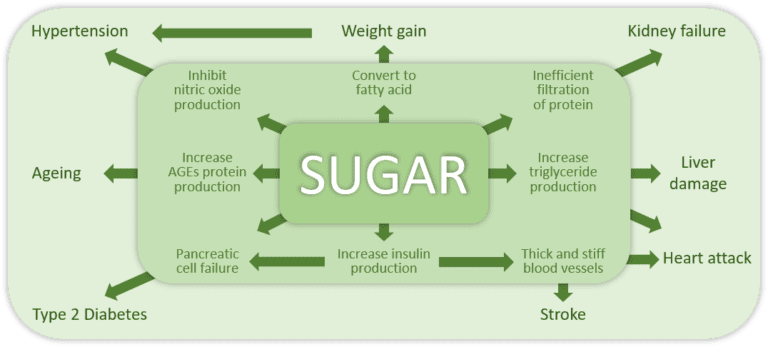Page Contents
Sugar is a common ingredient in cooking, it is also an important source of energy for your brain and body to function in optimal conditions.
Since young, you have been eating and drinking sweet stuff. From candies to cakes to desserts, from milk to bubble tea to carbonated drinks. Nowadays, it is very common to see youngsters and working adults holding a cup of branded coffee or bubble tea. Whenever you go to fast-food restaurants, they will enticed you to buy meals with carbonated drinks. Some fast-food restaurants even offer free flow of carbonated drinks when you dine-in.

What foods are high in sugar?
On a daily basis, you are exposed to different variety of sweet foods and drinks. Some examples are:
- Sweets (candy), milk chocolates, raisins, candy floss, chewing gums
- Baked goods: cakes, cookies, pies, Swiss rolls, breads, sweet rolls, doughnuts, cereal bars, commercial cereals, tarts, puff
- Dairy desserts: ice cream, yogurt, puddings, condensed milk
- Sweetened drinks: soft drinks, sports drinks, energy drinks, concentrated juice, fruit punch, milkshakes, bubble tea
- Sweet coffee: mocha, frappé, cappuccino, caramel macchiato, Vietnamese coffee, Irish coffee
Other than the foods and drinks listed above, there are actually some foods that contain hidden or indirect sources of sugar.
- Breads, potatoes, corn, grains, beans
- Instant tomato and mushroom soups
- Instant noodle and seasoning
- Ketchup, chilli sauce, BBQ sauce, salsa dip, mayonnaise, mustard, pasta sauce
- Some chicken stock and broth
- Jam, jelly, fruit butter, peanut butter
- Low-fat and diet foods
Implication of high-sugar diet
When consuming foods with carbohydrate or sugar content, the sugar will be broken down to glucose and released into your bloodstream. Your pancreas will produce insulin that helps to stimulate the cells to receive the glucose to be metabolised for energy.
- Weight gain and obesity
Sugar is high in empty calories and it has no nutritional values. Unutilised sugar in your body gets converted to fatty acid and stored as fat. The more sugar in your system converted to fat, eventually you will gain more weight and become obese. Find out your Body Mass Index (BMI) here and see which category you are in. - Type 2 diabetes
Type 2 diabetes happens when your pancreas stops insulin production or cells no longer respond to insulin. It is not caused by eating excess sugar, but caused by insulin resistance and pancreatic cell failure. When high sugar level in the blood triggers pancreas to produce more insulin, but high body fat reduces the insulin sensitivity. Your body will produce more and more insulin. Over time, an overworked pancreas stops producing insulin and blood sugar will become persistently high. - Heart disease and stroke
The more sugar you consume, the more insulin will be released into bloodstream. When the glucose storage in cells has reach a plateau, the extra insulin will stay in your blood. Over time, excess insulin can cause the artery walls to grow thicker and stiffer. This can lead to heart failure, heart attacks, and strokes. - Kidney diseases and urinary tract infections
Glomerulus is a dense network of tiny blood vessels in the kidneys. Diabetes can cause inflammation and narrow the capillaries. The disruption of blood flow will lead to tissue damage and inefficient filtration of protein, causing high albumin in the urine. Diabetes also damages the nerves of the bladder and you will not know that your bladder is already full. The urine trapped in bladder can then increase the pressure and damage your kidneys. Another serious consequence of diabetes is getting bacterial infections in the kidney, bladder and urinary tract. - Fatty liver and gout
Sugar gets broken down to glucose and fructose in your body. Excess fructose is metabolised in the liver into glycogen and triglyceride. High level of triglyceride increases your risk of heart diseases and fatty liver. Fructose also raises the blood uric acid level; the uric acid can be crystalised in your joints and develop as gout. - Early ageing
High sugar intake can increase the production of AGEs protein (advanced glycation end products) in your tissues. This protein can cause stiffening and losing of elasticity of your skin, leading to structural damage and wrinkle formation as an early sign of ageing. Scientists also claim that this condition can happen in any organs.
There are other implications of high-sugar diet. For example, tooth decay, gum disease, decrease bone quality and density, cognitive decline, and depression. For further reading, please click the link here.

Not all sugars are bad
It is not true that you must avoid sugar at all costs. There are 2 types of sugar:
Naturally occurring sugar
- Lactose in milk
- Fructose, glucose, and sucrose in fruits, raw honey, vegetables
- Maltose in germinating grains
Added or artificial sugars
- Refined table sugar (white sugar)
- Concentrated fruit juice, honey and syrups
Naturally occurring sugar contains vitamin, mineral and nutrients. While refined sugar is high in calories and of no nutritional values, it just serves to enhance the taste and satisfy your sweet tooth. In other words, naturally occurring sugar is still safer than its counterpart if consumed in moderation.
How to reduce sugar intake?
Knowing all of the above is not good enough. Ultimately, it is important to know how you can control your sugar intake and live a healthier and longer life. Here are some advice:- Cut back on the unnecessary sweet foods and drinks listed above.
- Avoid taking added sugar or free sugar, choose naturally occurring sugar.
- Eat more fresh fruits and vegetables, avoid processed and preserved foods.
- Take sweetener in moderation, even it is natural sweeteners. Over-consumption will lead to health problems.
- Always check out the sugar content on the nutrition facts label.
- Be aware of other names of added sugar, for example, dextrose, maltose, sucrose, fructose, etc.
- Stay away from foods that are claimed to be low-fat or diet foods. They may contain less or no fat; but many of them contain high sugar.
- Exercise regularly to burn off excess calories, and drink more water to dilute your blood sugar.
Conclusion
To minimise your chances of getting chronic conditions at older age, such as diabetes, hypertension, heart disease, stroke, kidney disease, and so on, what you can do now is to start with your diet. Consume less salt, less fat, and less sugar. Exercise and hydrate yourself regularly and make sure you get enough rest.
